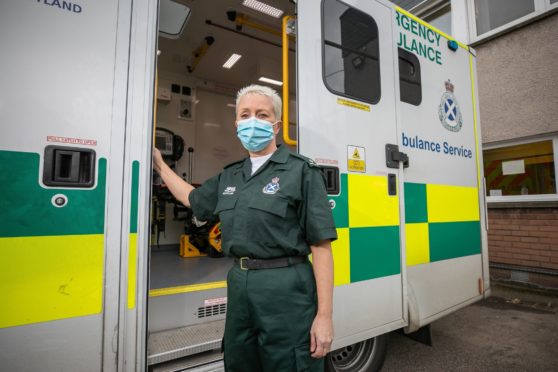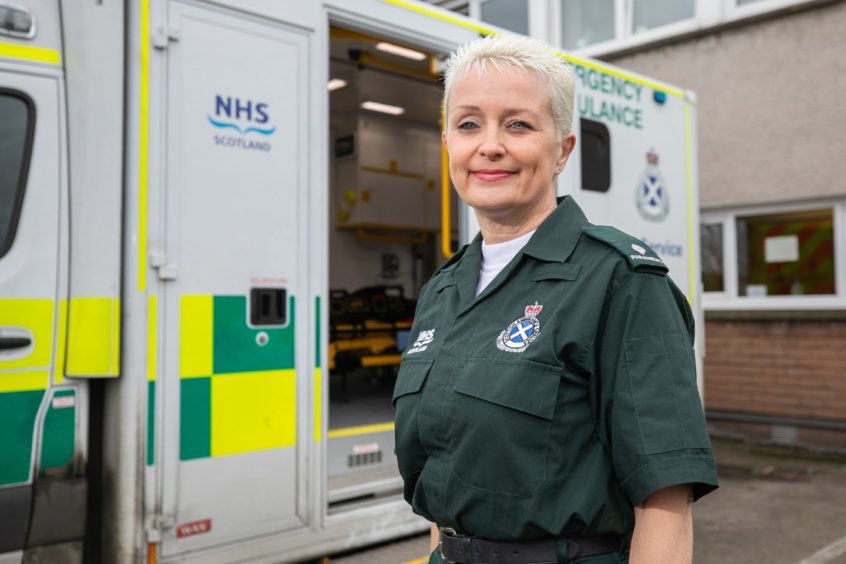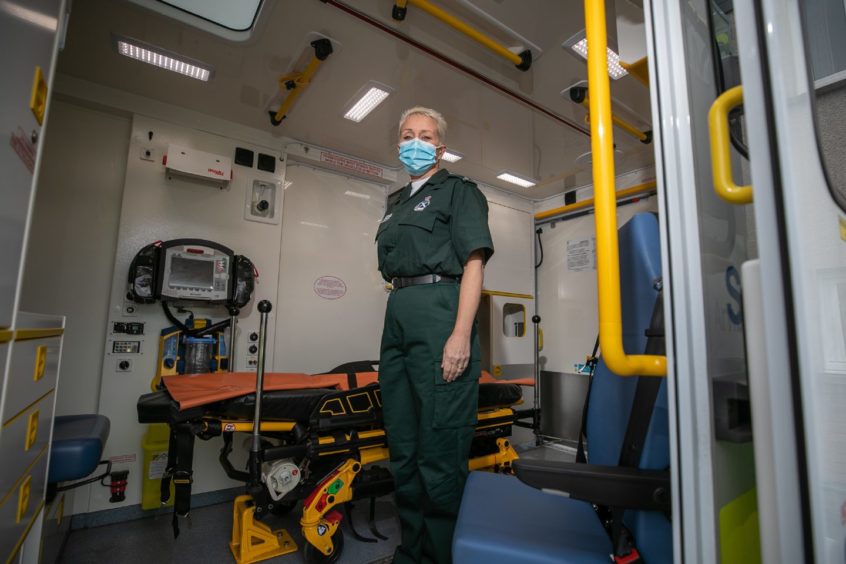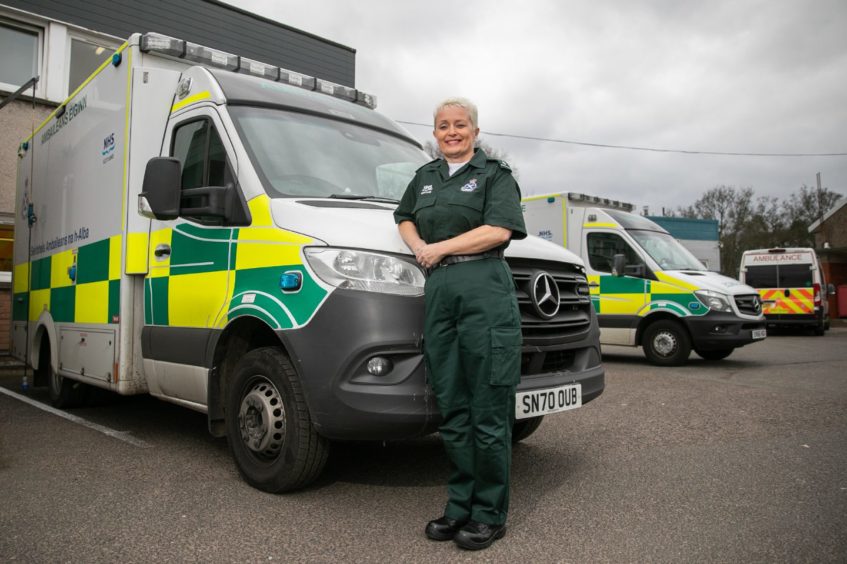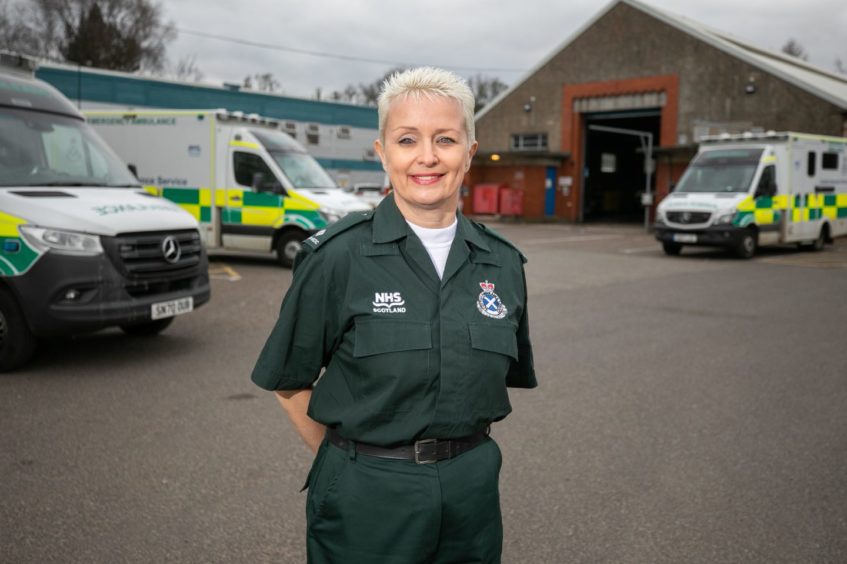A lead paramedic has revealed she felt “frightened” for the first time in her 26-year career when dealing with Tayside’s first Covid case.
However Amanda Burnett, paramedic clinical team leader for the Scottish Ambulance Service in Dundee and Angus, now says she is looking “forward, not back”.
Ambulance crews have recently been offered vaccinations and home testing kits, but the last 12 months have been exhausting for many in the service.
Amanda has attended every type of 999 call and urgent care incident throughout her well-established career.
But when she was sent to support a crew to assess one of the first potential Covid-19 positive patients in Tayside, last spring, it proved a pivotal moment.
Amanda said: “The crew had been supplied with HAZMAT suits and face fitted masks.
“I was to drive the ambulance to the hospital and for the first time in my career, I was frightened.”
Staff scared to go to work
She says almost immediately after that, ambulance crews were issued with updated PPE, and began treating Covid patients on a daily basis.
She said: “Some colleagues had to shield due to underlying health conditions and others were scared to come to work.
“We were terrified we would catch Covid or worse, take it home to our families or put others at risk.
“In the early days, advice changed almost daily and we adapted very quickly.
“We are trained to dynamic risk assess every situation and we started to assume every patient we treated potentially had Covid.”
Amanda admits that she and her colleagues became frustrated with families members, friends and the public who did not believe Covid was real or who would bend and break the rules to suit.
She said: “We struggled through demanding shifts, assessing, treating and transporting patients with a variety of injuries and illnesses, including Covid.
Patients’ attempts to avoid hospital
“We tried to reassure others who were reluctant to share their symptoms, as they didn’t want to bother anyone and were scared to go to hospital, that they would be safe.
“We also supported a lot of people struggling with mental health, loneliness and isolation.
“Sadly, we attended too many deaths in the community.”
Amanda says that in the early days of the pandemic, and often after busy shifts, ambulance workers would have to search supermarkets for shopping, “shocked by some people’s selfishness”.
She said: “Our spirits were lifted by friendly smiles, waves and generous food donations to local ambulance stations.
“We lost colleagues, family and friends. Some of us caught Covid and were really unwell. Some recovered fully, some are still struggling
“Some tested positive with few symptoms and lots think we have had it but will never know.”
She added: “Colleagues struggled to juggle childcare and home schooling but know how important our job is.
“We have cared for patients and supported families to the best of our ability. It has been the most challenging year ever.
Relentless dedication
“At times we have felt overwhelmed, we have cried, shared our fears, wiped away our tears and gone out to respond to the next emergency.
“We are not superheroes, we have all suffered mental and physical fatigue at some point.
“We must be aware of our own mental health and be kind to ourselves as well as our patients.”
Ambulance crews offer support to each other, receive support from managers and Scottish Ambulance Service’s wellbeing groups and webinars.
72 cases of Covid
There have been 72 cases of Covid-19 amongst ambulance staff in Tayside and Fife, between March last year and January.
Of those cases, 34 were in Fife, 17 in Dundee, 11 in Angus and 10 in Perth.
None of those cases were fatal.
In Fife there was one case in March, nine in April and four in May.
There were then no cases until October when there were four, followed by three in November, eight in December and five in January.
Tayside
In Dundee, three cases were in March, five in April and no more until September when there was one case.
Then another two in October, three in November, none in December and three in January.
In Angus there was one in March, seven in April, then none until October when there was one case.
Another one followed in November and a final one in December.
In Perth there were no cases of Covid in Ambulance staff until October, when there were two.
Then there was one in November, five in December and two in January.
Safety is priority
A woman for the Scottish Ambulance Service, said: “The safety of patients and staff is our top priority, which is why we adhere to strict Government guidelines.
“This includes ensuring staff wear full PPE, observe appropriate social distancing and that our vehicles and ambulance stations are cleaned regularly and rigorously.
“All staff who tested positive for Covid-19 followed strict self-isolation protocol and ambulance cover was not adversely affected by these staff absences.”
